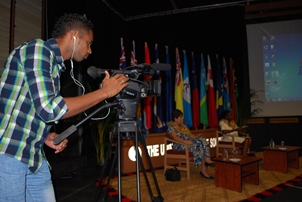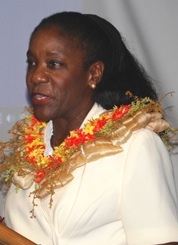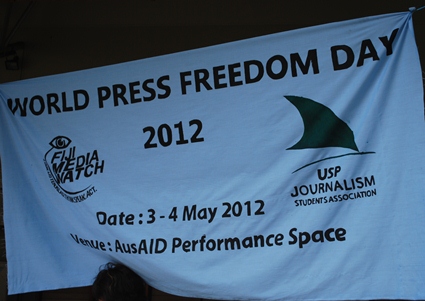
OPINION (Pacific Media Watch): At times, the media is poor at covering its own issues. We would rather point the spotlight away from ourselves. But when it comes to press freedom, most journalists have a word or two to say, hence the plethora of reports and opinions last week.
Universities and journalism schools on the other hand, aren’t so vocal here in New Zealand, and perhaps it is because we take press freedom for granted. At the University of the South Pacific in Fiji last week, a full two-day schedule featured events run by students as well as staff, with speakers from the industry, the USP journalism school, and the United States Ambassador, Frankie A. Reed.
The major newspapers published double-page spreads and promoted press freedom in the face of a regime that until recently had uniformed military in their newsrooms.
And everyone from the US Ambassador to the deputy vice-chancellor described themselves as closely as they could to the journalism profession.
Free press good
Ambassador Frankie A. Reed was a journalist in a past life and said a free press was essential for a good economy.
“Where there are limits on free press, the individual, society and the economy suffer.”
She said the home of the free and the land of the brave welcomed Fiji’s lifting of the Public Emergency Regulations (PER) and called on “all governments to do what is necessary to create the space to for all journalists to do their work without violence and fear of persecution”.
Deputy vice-chancellor Professor Susan Kelly is also a writer and she said the first of Franklin D Roosevelt’s "Four Freedoms" – the right to free speech – included the right to distribution as well. These rights are worth fighting for, even though sometimes “it’s ugly, unpleasant and unwelcome”.
Next to speak was the head of journalism at USP, Dr Marc Edge, who had been in the middle of a media storm throughout the week concerning his dispute with the regional media body PINA (Pacific Islands Media Association) and what actually did or didn't happen at the recent Pacific Media Summit.
For someone who had been described as a critic of those who call for a different style of journalism in the Pacific, Dr Edge was very positive in his outlook for Fiji, albeit a little tongue-in-cheek.
Fiji 'leading the way'
As well as the lifting of the PER, he said Fiji had in fact led the way with the Media Industry Development Decree as it had included a clause on foreign ownership pointed directly at Murdoch’s former control of The Fiji Times.
“Fijians can take pride that they have once again been a step ahead of the rest of the world by ridding themselves of a media owner who was recently deemed in the UK as 'not a fit person' to own a large international media company,” he said.
“I read a headline on The Guardian newspaper's website recently that could just as easily apply to Fiji: "We are rid of Murdoch and that is worth celebrating."
Dr Edge asked several burning questions about the current media climate and just how journalists should find their way forward.
“How will the media here handle their new-found freedom? How free will they be allowed to be? How free should they be allowed to be?”
He referred to an article by former Daily Post publisher Thakur Ranjit Singh which had argued for a “controlled” media system.
“Singapore, Malaysia and Indonesia, in 1960s and 1970s, looked at journalists as government partners in nation building, and this is the model which we need to emulate in Fiji,” Singh had written.
Caution on models
But Dr Edge put the audience on notice about what to wish for.
“I would be very surprised if Fijians wanted the kind of political repression and media intimidation they have in Singapore, where I taught for several years. As a result of the government's tight control of the press there, the same political party has held power continually for more than 50 years.
“I think that is all you really need to know about the press system in Singapore.”
The audience themselves were a mix of professionals, visiting academics, members of diplomatic corps and of course, aspiring young Fijian journalists.
Ambassador Reed praised those who report in trying circumstances such as those in Fiji. “We salute those in the press who do their work at great risk. I encourage all aspiring journalists here to continue despite the challenges you face.”
As managing director of Fiji Village, William Parkinson told me when the media decree was passed: “We have to deal with the situation at hand.”
“Getting shut down would not serve anyone’s purpose. Martyrdom is tempting in this situation and it may earn you international glory and invites to lots of conferences but it is pointless if you are off the air.”
Student power
Perhaps the most heartening words for students came from their own deputy vice-chancellor: “Students can make a difference.”
Indeed in the current environment, journalism students can arguably test the waters more than the major newspapers. The USP journalism newspaper Wansolwara is distributed with the Fiji Sun.
In the latest edition, students comprehensively covered media freedom events, as well as the row with their own head of school.
And to prove that they aren’t only covering their own issues, their front page broke revealing developments in the Miss World Fiji controversy.
The students had earlier held a panel discussion, which included honest accounts of previous experiences in newsrooms. They spoke of low pay, a lack of encouragement and leadership, and unrealistic demands of editors.
But most concerning among some was the lack of value placed on educated journalists by media organisations, which have at times favoured cheaper labour in the form of high school graduates.
So media freedom issues are broad, and they affect journalists and the public well before a journalist walks into the newsroom.
New association
The Ministry of Information, usually the bearer of unwelcome news on media freedom, supported the plight of underpaid journalists, in an article published by the Fiji Times.
“If your bosses want you to be professionals, they need to pay you as professionals,” said Permanent Secretary Sharon Smith-Johns.
Perhaps the talk of a new association to represent journalists in Fiji is something students can take heart from. PINA manager Matai Akoula said it would be helpful to have a body that could back up professionals.
"We want to form an association that will look after our interests, fight for our pay, help us get our jobs if we've been unreasonably sacked and generally help us as journalists," he said.
As long as that new media association stresses the importance of investing in young but educated journalists, it may achieve a much better deal for media freedom in Fiji.
Alex Perrottet is contributing editor of the Pacific Media Centre’s Pacific Media Watch freedom project and was in Fiji for the UNESCO global free press activities. He was assisted by AUT University's Pacific Media Centre as well as the University of the South Pacific.

This work is licensed under a Creative Commons Attribution-NonCommercial 3.0 New Zealand Licence.



